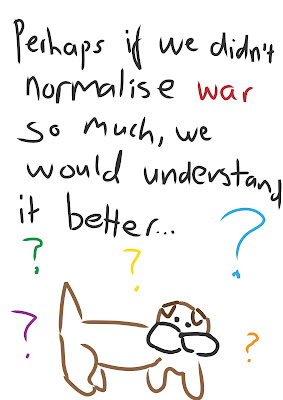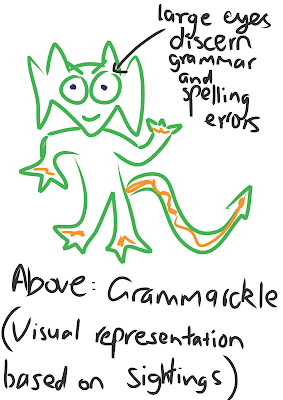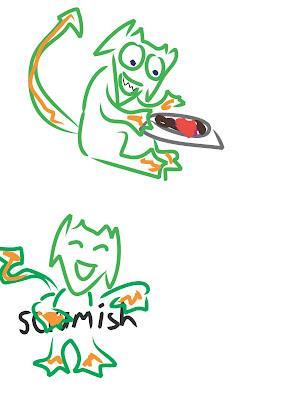01 December, 2010
"I'm Sorry Sir, This Card Has Been Cancelled"
30 November, 2010
Hayfever Sweeping the State Due to "Christmas Allergy"

15 November, 2010
Qantas Plane Turbines "Spewing Confetti"
I'm A Real Journalist?
Perhaps owing to the rainy Melbourne weather, Sunday afternoon timing, or the end of year exam period for university students, it was a modest audience who greeted Deputy Greens Leader Christine Milne, MP Adam Bandt, and inner-city Greens candidates at yesterday’s forum on the balance of power and climate change, held at the State Library.
With the Victorian state election less than two weeks away, and the election of up to four inner city Greens candidates seemingly within reach, Senator Milne focused on how the balance of power the Greens won in the Federal election had been successfully harnessed as a “pathway to government”, citing the inclusion of Indigenous people and local councils in the constitution as an important gain.
She also looked to the opportunity that gaining lower house seats on November 27 would offer with “the linking of policies from local, to state, to federal.”
Particular emphasis was given to climate change and the Climate Change Committee negotiated by the Greens, which Mr Bandt described as “a reset button.”
Senator Milne discussed the inclusion of experts in the committee rather than involving them in a solely advisory role. “It is really hard to run political games when there are experts in the room,” she said. She also spoke on the psychology of the committee, which she said would give politicians room to change opinions and be supported by the consensus of a committee.
The meeting concluded with a sense of optimism for the coming election, as Brunswick candidate Ms Cyndi Dawes was hopeful about the result, “whether we win one seat, or three seats, or four.”
This is an outcome which became less likely last night, when the Liberal party announced its intention to preference the ALP ahead of the Greens in all lower house seats.
While The Age, the Herald Sun, and The Australian have all unanimously asserted that the Liberal’s decision will almost certainly enable the ALP to retain these seats, ABC election analyst Anthony Green had a different take on the implications, writing “the Greens can still win Melbourne and Richmond.”
I'm not sure that it's going to be published.
I don't feel that it's excellently written. It is jumbled, and perhaps tries to tackle too much in so few words (right up against the word limit for publication in this particular online newspaper).
But at the same time it has made me feel good, because it is a beginning.


12 November, 2010
Who Is Getting Up?

03 November, 2010
"Edgy"

30 October, 2010
Daytime TV
Daytime television nearly always leaves me feeling depressed, confused, and upset at the hours I have lost watching it.
And so the last time I was watching, I decided that it was time to get to the bottom of why.
The reason became patently clear once I started actually looking for it. It isn’t the programming, even though the mildly amusing 80s American ‘thrillers’ enjoy a more privileged midday movie position than they should.
The reason is what goes in between the programs.
It’s the ads.
Ads in different timeslots address us differently. During Masterchef, we might be bombarded with ads encouraging us to incorporate Western Star butter into our culinary adventures, or to use Handee Ultra when we (or our exceptionally gifted children) make a mess in the process of crafting the perfect chocolate fondant.
But daytime television ads are different. These are just some of the things they tell us:
- You are flabby, and need to purchase an Ab-Pro or similar to tone your body
- You are fat, and need to join Weight Watchers to lose the weight and keep it off
- You are too hairy, and need to go to a painless laser place to remove unwanted hair
- You are going bald, and need to visit Ashley and Martin (I’m never sure whether this name is the two surnames of the business partners, or the first names of a homely couple who run a pretty slick hair regrowth clinic)
- You have bad teeth – they are either too sensitive, and you need Sensodyne (advertisement complete with erratic camera cuts), or they are yellow and unattractive, in which case you need a UV whitening light (a solarium for your mouth? Sure, sounds harmless enough)
- You need Foxtel, because the fifteen or so free to air channels are not enough to satisfy your endless search for mind-numbing content. Also, your life will revolve around recording, re-watching, replaying and basically living off, your new Foxtel channels
- You are involved in a lengthy and very costly legal struggle, and require some ‘no win, no cost’ lawyers to help you out with an obligation free phone call
- Your skin is too pale; you need to tan up either with a spray, lotion, or good ole’ solarium
- You have severe acne which is inhibiting your life – you must use the same thing that Delta Goodrem used
- You are in severe debt, and it is time to call a helpline
When I’m pummelled with these ads during the day, I begin to feel sick. I feel that my life is wasting away in front of the television. How will I foot the bills for the arduous legal battle I’m embroiled in anyway?
By addressing us with these messages, the advertisements attempt to shepherd people into the respective roles, and it is this that depresses me.
The final message is, perhaps, all things considered, the kindest one.
Having constructed daytime TV watchers as balding, pasty, chubby, legally hopeless, hairy, gat toothed, debt-ridden, afflicted individuals, the advertisements at least have the mercy to remind us that we will probably die soon.
Grandparents, ruffling a small child’s hair before staring down the camera and smiling serenely as they say,
“We love to keep active and enjoy life. But we know we won’t be around for much longer.”
Then some crisp, suited up woman usually spring in and starts spruiking a funeral plan or life insurance scheme that will mean no family has to bear the financial burden of all the funeral costs. It is always entertaining to watch them attempt to make the proposition of “if you give me your money now, I will help pay for your funeral later” sound tasteful.
And that is why I don’t like daytime TV.


18 October, 2010
Angry Lady Waits in Queue
03 October, 2010
AFL and War: Let's Make a Comparison



27 September, 2010
Blessed Fat Chips
Some soft news writing from journalism today:
I approach the shop slowly, drinking in the brightly lit display of curry puffs, hash browns and spring rolls. The smell of sizzling oil wafts delicately from the back kitchen. Engorged pizzas drip with cheese. And chips. Glistening, golden brown, oil-saturated chips
I approach the counter, and am greeted by a cheery girl, wearing a yellow t-shirt, boldly emblazoned in red with the name of the shop, Fat Chips. She smiles from behind her rectangular glasses.
The question tumbles from my mouth like a potato cake into the fryer. Why Fat Chips?
“People like chips. Students like chips!” she explains passionately, adding that everyone is “all laughing together” when they encounter the refreshingly irreverent name.
A community is formed around Fat Chips, she says, as RMIT teachers and students (attracted, she reflects, by their cut-throat prices) frequently buy their food there, and come to “know us”.
As we speak I look down, and notice that we are standing at the other side of the store. On display at the bench are sandwiches, vegetarian focaccias, carrot, chicken and beetroot wraps. I buy a fruit salad, a goodwill gesture.
These offerings seem incongruous with the gleaming, salty foods presented at the other end of the store. Yet I am beginning to feel that there is much about Fat Chips I do not understand.
I begin to ask another question, but a sudden flurry of customers down at the chips end of the store distracts her, and I realise I will not even have another chance to ask another question, or even her name – my brief glimpse into this noble institution is over.
As I bite into the apple in my fruit salad, it tastes floury and insipid.
Perhaps the apple is not enough. Perhaps I crave something more. Perhaps I crave... fat chips.
19 September, 2010
Just Say Hi!
16 September, 2010
Enough Is Enough
15 September, 2010
It's Not Enough
12 September, 2010
So it goes Part 2.
 NIPAPORN said...
NIPAPORN said...I have suffered with bad breath for about 9 years now. I spent a small fortune on bad breath cures. Nothing I tried seem to work even as it said it would. I read this site and think it is useful and gives me something to think about. In any case it is always helpful to just to have people writing about it. I did find this site Oraltech Labs & their advice helped me most, I’ve got a boyfriend now & he said its working, hope it helps you too. Kindest, Kathy Jones. NJ.
10 September, 2010
So it goes.
Today has been an unusual day thus far.
I’ve been reading Slapstick, a novel written by Kurt Vonnegut. He’s dead now.
Hi ho.
And I’m having one of those experiences where I’ve become so immersed in a book that I’m not even jolted into the outside world, but instead seeing it through the narrative lens of the book I’ve just been reading. Everything I see, I seem to imagine it through the dry, understated, deadpan humour of Vonnegut.
So it goes.
When I got off the train at Melbourne Central this morning, there was a woman at the top of the escalator. She was handing out pamphlets.
Pretty much everyone went past her, because they were probably in a hurry – they were right lane escalator people – no time to stand still. I took one of her brochures, and looked at it. It said on the front, which was yellow, with a big blue number ‘1’:
“What is the one thing you need to know before you become pregnant?
Take folic acid!”
On the inside it explained that folic acid prevents birth defects such as spina bifida by up to 70 percent. Spina bifida is a neural tube defect and the most common one is when the spinal cord is poorly formed.
I turned around and nearly gave her back the pamphlet, because I’m not going to become pregnant anytime soon. Then I realised that she probably had spina bifida. She was in a wheelchair, you see.
So it goes.
Then I kept the pamphlet and read it cover to cover, because I figure that way at least her time wasn’t wasted. I already knew that folic acid was important, but now I feel like writing about it.
You can get folic acid through green leafy vegetables such as spinach and broccoli, lentils, chickpeas, oranges, and cereals.
The brochure was sponsored by Bayer HealthCare, who I guess want to sell folate supplements. The brochure says that “even if you eat food which has folic acid added to it, such as bread, you will almost certainly need more to obtain the required amount. Taking a supplement will help you to meet your daily needs.”
Hi ho.
And I’m sitting here at university, still in the bookish daze that follows immersion in a novel or written world.
I think I like Vonnegut’s writing because he doesn’t labour. He doesn’t force. He just writes what he sees. Sometimes that’s something bizarre, impossibly far fetched, and grotesque, but somehow it all feels true as well, because the world is crazy like that. People do die in freak accidents, or survive, or find themselves unable to love.
One of my favourite parts in Slaughter-House Five is the description of a book by fictional author Kilgore Trout:
“It was about a robot who had bad breath, who became popular after his halitosis was cured. But what made the story remarkable, since it was written in 1932, was that it predicted the widespread use of burning jellied gasoline on human beings.
It was dropped on them from airplanes. Robots did the dropping. They had no conscience, and no circuits which would allow them to imagine what was happening to the people on the ground.
Trout's leading robot looked like a human being, and could talk and dance and so on, and go out with girls. And nobody held it against him that he dropped jellied gasoline on people. But they found his halitosis unforgivable. But then he cleared that up, and he was welcomed to the human race.”
He also presents a picture of the world that I don’t find completely depressing, even if his conclusions seem to be that humans will always kill each other, use intelligence for evil, and have wars, etc.
And so on.
P.S. There is something to be enjoyed about late night train trips.
Standing at Flinders Street, hoping I’ll see a rat scurrying about the dark, wet tracks,
When a cat at a station pads past in perfect time with my music.
04 September, 2010
The Competence Facade





31 August, 2010
I Write Like Me
27 August, 2010
This was posted on the 27th August!
24 August, 2010
The Grammarckle


- Masters, John, and Smith, Geraldine, Mind Over Matter: How the Grammarckle Is Controlling Us All, published by Cambridge University Press, 2006, Cambridge
- Williams, Henry, Taming the Grammarckle Within, published by Random House, 2009, Canberra (pp. 30-56)
